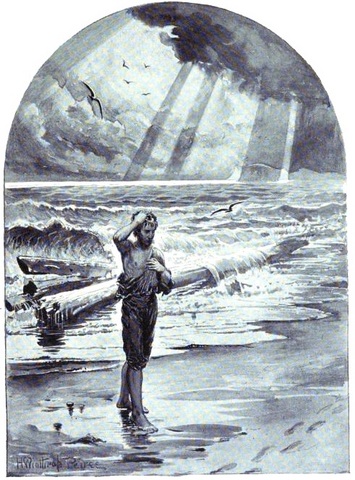「どんな空が自分の上にあろうとも、わたしはいかなる運命にもむかう心をもつ」――3月4日の手紙 (3) "Whatever sky's above me, I've a heart for any fate": The Letter of March Fifth (3) [Daddy-Long-Legs]
前の記事で引用した『あしながおじさん』4年生3月5日の手紙の一節の最後の引用符に入っている "Whatever sky's above me, I've a heart for any fate." (「どんな空が自分の上にあろうとも、わたしはいかなる運命にもむかう心をもつ」)について。
これは、早くに岩波文庫で遠藤寿子が「空が頭の上でどんな顔をしていようと、わたしはびくともしない覚悟だ。」と訳して、割注で「(バイロンの詩 "To Thomas Moore" の中の詩句)」と注記しているように、イギリスのロマン派詩人、バイロン卿 ジョージ・ゴードン・バイロンの詩の引用です。"sky" は日本語(英和辞典)だと「空模様」という感じかもしれません。もっとも、そう言い出すと、"heart" も「勇気」だと言い出しかねなくなりますけれど。
バイロン(George Gordon Byron, 1788-1824) の友人で、バイロンの文学管財人 literary executor (ポーに対するグリズウォルドみたいなもんです)に生前指名され、のちに書簡や日記を編纂し、(伝記は遺族によってダメ出しされ破棄しますが)回想記を出版することになる、アイルランドの詩人トマス・ムア (1779-1852) 宛の1817年7月10日付けの手紙に挿入されていた詩です。短いので全文引きます。――
My boat is on the shore,
And my bark is on the sea;
But, before I go, Tom Moore,
Here's a double health to thee!
Here's a sigh to those who love me,
And a smile to those who hate;
And, whatever sky's above me,
Here's a heart for every fate.
Though the ocean roar around me,
Yet it still shall bear me on;
Though a desert should surround me,
It hath springs that may be won.
Were't the last drop in the well,
As I gasp'd upon the brink,
Ere my fainting spirit fell,
'Tis to thee that I would drink.
With that water, as this wine,
The libation I would pour
Should be―peace with thine and mine,
And a health to thee, Tom Moore!〔太字強調付加。text は、たとえば "To Thomas Moore Analysis George Gordon, Lord Byron: Summary Explanation Meaning Overview Essay Writing Critique Peer Review Literary Criticism Synopsis Online Education" <http://www.eliteskills.com/analysis_poetry/To_Thomas_Moore_by_George_Gordon_Lord_Byron_analysis.php> (いまのところ書き込み一個もないんすけど〕
第2連3行目の And のあとの "whatever sky's above me," は(大文字を別として)全く同じですが、その次の行の "Here's a heart for every fate." はジュディーの "I've a heart for any fate." とビミョーに違っているのがわかります。
そこでアメリカ文学的におのずと思い起こされるのは、ちょっと遅れてきたアメリカのロマン派詩人ロングフェロー (Henry Wadsworth Longfellow, 1807-82)の "A Psalm of Life" (1838) という、たいへん有名で、よく朗誦された詩です。「人生讃歌」と訳されますが、詩の副題というか、冒頭に "What the Heart of the Young Man Said to the Psalmist" (若者の心が讃美歌作者に語ったこと) とあって、因習的なキリスト教の人生観を批判しているところがある(それゆえロマン主義的)とふつう考えられています。長いけど全文引いちゃいます。
"A Psalm of Life"
What the Heart of the Young Man Said to the Psalmist
Tell me not in mournful numbers,
Life is but an empty dream!
For the soul is dead that slumbers,
And things are not what they seem.
Life is real! Life is earnest!
And the grave is not its goal;
Dust thou are, to dust thou returnest,
Was not spoken of the soul.
Not enjoyment, and not sorrow,
Is our destined end or way;
But to act, that each tomorrow
Find us farther than today.
Art is long, and Time is fleeting,
And our hearts, though stout and brave,
Still, like muffled drums, are beating
Funeral marches to the grave.
In the world's broad field of battle,
In the bivouac of Life,
Be not like dumb, driven cattle!
Be a hero in the strife!
Trust no Future, howe'er pleasant!
Let the dead Past bury its dead!
Act, ―act in the living Present!
Heart within, and God o'erhead!
Lives of great men all remind us
We can make our lives sublime,
And, departing, leave behind us
Footprints on the sand of time;
Footprints, that perhaps another,
Sailing o'er life's solemn main,
A forlorn and shipwrecked brother,
Seeing, shall take heart again.
Let us then be up and doing,
With a heart for any fate;
Still achieving, still pursuing,
Learn to labor and to wait.〔太字強調付加。この詩はトロント大学の RPO: Representative Poetry Online に注釈付きで載っています <http://rpo.library.utoronto.ca/poem/1339.html> しかし "psalmist" を詩人自身としているところが解せませんが・・・・・・自己分裂ということですかね〕
9連からなるけっこう長い詩だし(この詩を対訳と注釈付きで入れている岩波文庫の『アメリカ名詩選』が見つからないので)、とりあえずでだしのところを(Web 上で訳が付いている紹介は「人生賛歌--ロングフェロー-ヘ短調作品34」 <http://blogs.yahoo.co.jp/fminorop34/48575467.html> など)――「わたしに言わないでくれ、悲しい調べで/ 人生はただむなしい夢だなど!/ 眠りこける魂は死んだも同じ/ ものは外見とはちがうのだから。// 人生はリアル! 人生は大事!/ 墓がそのゴールではない/ 汝塵なれば塵に帰るとは/ 魂について言われたことではない。」 旧約聖書「創世記」にあって、埋葬の祈祷の一節に用いられることでも有名な "In the sweat of thy face shalt thou eat bread, till thou return unto the ground; for out of it wast thou taken: for dust thou art, and unto dust shalt thou return." (Genesis 3.19) の "shalt thou return" が、earnest と韻を踏ませるべく助動詞 shall を落として "thou returnest" に変えられてますけれど、聖書の教えへの言及は明白で、塵に帰るのは体的部分であって魂は違う、と主張すると共に、現世における生こそがリアルだ、とプラトン的=キリスト教的世界観に(一定程度は)異を唱えるわけです。まあ、そのさきで霊的な神秘主義にむかうわけではなく、むしろ現実を大事にすること、「人生という戦場で・・・・・・戦いの英雄であれ」(第5連)という現世肯定と進歩のメッセージが主眼なのですけれど。
そういう詩の最終第9連に、バイロンからの「引用」が出てきます。その2行目の "With a heart for any fate" は、バイロンそのもの("Here's a heart for every fate" )ではない。そして、むしろ『あしながおじさん』のジュディーの "I've a heart for any fate" に近いところもあります。あるのではないでしょうか。少なくとも詩全体のメッセージは、ロングフェローの「人生讃歌」のほうがジュディーには共振するところが大きいと思われます。
だとすると、このジュディーの「引用」の「原典」とのズレは、意識的なものであって、英文科の学生として英米の詩人を勉強したジュディーの成果がひそかに示されている、と言うこともできるのではないかと思ったりもします。
From A Psalm of Life (New York: E. P. Dutton, 1891), image via Wikimedia <http://commons.wikimedia.org/wiki/File:A_Psalm_of_Life.png>
- Footprints, that perhaps another,
- Sailing o'er life's solemn main,
- A forlorn and shipwrecked brother,
- Seeing, shall take heart again.
E-text:
A Psalm of Life (New York: E. P. Dutton, 1892) [illustrated] <http://www.archive.org/stream/apsalmlife00peirgoog#page/n8/mode/1up>
A Psalm of Life (New York: Lovell 1900) [譜面付き]<http://www.archive.org/stream/psalmoflife00long#page/n7/mode/2up>
"A Psalm of Life" は岐阜女子大のDEAPA (Digital English and American Poetry Archive) (科学研究費補助金(基礎研究C);「デジタル・アーカイブを用いた英語教育・異文化コミュニケーション教育の基礎的研究」)にも入っていました(岩波文庫の『アメリカ名詩選』の訳と注釈が組み込まれている様子です)――<http://dac.gijodai.ac.jp/studioM/deapa/poem_long01.htm#top>





kaoru さま、おはようございます。よい一日をおすごしください。
by morichanの父 (2010-01-06 08:04)